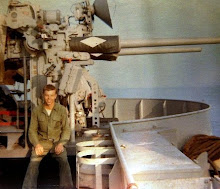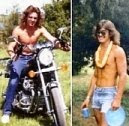"Night into Morning"
This is the storyline of the 1951 film, "Night into Morning" ....
Berkley English professor Phillip
Ainley (played by Ray Milland) has a wife and young son who are killed in a gas explosion in their home. Unable to cope with the situation, he begins
to drink heavily and becomes suicidal. His friends, Tom Lawry (also an English
professor, portrayed by John Hodiak) and Katherine Mead (Lawry's fiance, a war widow
and the English department secretary, depicted by Nancy Davis, the future Mrs.
Ronald Reagan) try to return Ainley to normalcy (whatever that might be ....). Karl Tunberg and Leonard Spigelgass wrote the original screen play,
and Fletcher Markle directed the production.
The final scene of the film features
Ainley making closing remarks to one of his classes. Here are his words, as
best I could transcribe them while watching it and recalling them a few days
ago:
This is our last hour together. I'm not
going to keep you for it. But, I'll remember every one of your faces for the
rest of my life, and I rather imagine you'll remember mine because we've gone on
a journey together.
There were times when I lost my way and somewhere along the
road you and others became the teacher and I, the student. You've taught me
that as long as one man is without an answer, all men are without an answer.
You've taught me that only he who chooses to be alone, is alone. And so, even
though our small journey is over and we go our separate ways, we'll never
really be apart. Til the end of time we'll carry in our hearts the things that
we've shared together.
I'm sure someone somewhere said that
better than I, probably Shakespeare, surely the Bible, but I think it's
something a man should say at last to himself. As you know, I teach English,
but there are some things very hard to say in it. Goodbye is one of them. So,
if you don't mind, I'll use my first-year Spanish: Vaya con Dios. Go with God. Let's all go with God.
If someone were to ask me why I
decided to post Ainley's "sort of soliloquy" here, I might begin rambling on
and on with thoughts such as these: Movies in the 1940s and 1950s frequently
told stories and were, in a manner of speaking, morality plays worthy of
reflection; the words struck me as eloquent and profound as I heard them and later
remembered them; the words coincide with my own recent thoughts and questions
about life and living; I am a romantic and a fool, and I constantly am looking
for my own meaning and purpose; and, and, and ....
Well, those things, yes .... but, in
truth, I am pretty much of a lost soul stumbling in a seemingly never-ending
maze and keep looking for some manner of absolute, universal truth.
As Ainley's concluding dialogue would seem to indicate, he has begun to travel on the road toward learning how to live "normally" once again despite the loss of his wife and son, just as Mead had adjusted to the loss of her husband during World War II. Sort of a "happy ending."
Films of the 1940s and 1950s generally had happy endings -- which is what I require of all stories in my life and which is another reason why I put together a post about the movie. The title of the post is in reference to the music, but "with you or without you" certainly ties in nicely to the substance of the film. Scala, incidentally, is a Belgian women's choir whose musical selections frequently are covers of rock pieces. The final video is there just for the fun of it, baby .... and, as a reminder of the brevity of life ....
Anyway and whatever .... go with god .... or whomever your inner voice listens to ....
As Ainley's concluding dialogue would seem to indicate, he has begun to travel on the road toward learning how to live "normally" once again despite the loss of his wife and son, just as Mead had adjusted to the loss of her husband during World War II. Sort of a "happy ending."
Films of the 1940s and 1950s generally had happy endings -- which is what I require of all stories in my life and which is another reason why I put together a post about the movie. The title of the post is in reference to the music, but "with you or without you" certainly ties in nicely to the substance of the film. Scala, incidentally, is a Belgian women's choir whose musical selections frequently are covers of rock pieces. The final video is there just for the fun of it, baby .... and, as a reminder of the brevity of life ....
Anyway and whatever .... go with god .... or whomever your inner voice listens to ....














No comments:
Post a Comment